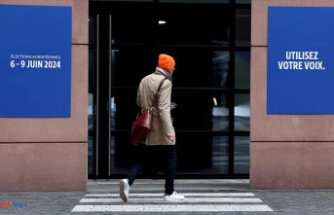Two months ago, one of the worst train accidents shook Germany: five people died when a train derailed in Garmisch-Partenkirchen. Politicians and the Bahn boss traveled to promise clarification. But much is still unclear.
Munich (dpa / lby) - Almost two months after the train accident in Garmisch-Partenkirchen with five dead, it is still unclear when trains will roll on the route again. Deutsche Bahn has not yet commented on the extent of the damage. There is no information beyond what has already been communicated, the railway explained several times on request.
Experts criticize the delays. "If this construction site had priority, it would be finished within a few weeks," said Markus Hecht, professor for rail vehicles at the Technical University of Berlin, of the German Press Agency. Shortly after the accident, he brought up track distortions as a possible cause.
Even after the accident in Eschede, it was driven again after a short time, said Hecht. In the Garmisch case, however, the railways have to replace around 700 meters of rails and 500 sleepers. The renewal of the sleepers is expensive, admitted Hecht. "It's like building a new track and takes a few days."
The train has too many construction sites - and too many slow-moving sections. That costs time and therefore money - and affects rail traffic, especially when there is high demand for the nine-euro ticket and the holiday season. "It is a huge weakness that you need slow-moving sections at all and thus reduce capacity - and thus contribute to the overcrowding of the trains."
Thomas Strang, an expert in communication and navigation at the German Aerospace Center (DLR), made a similar statement. If you prioritize one construction site, progress will be slower elsewhere. He criticized the information policy of the railways. "The public has a legitimate interest in being informed, including about interim results." Strang and Hecht referred to an EU rule, according to which the final report of the federal railway investigation agency on the course of an accident must be available within one year.
The redevelopment backlog from decades cannot be resolved in the short term, said Strang. He therefore spoke out in favor of measuring technology on normal trains. With inexpensive sensors, possible weak points could be detected early and permanently during regular journeys.
Hecht brought sensors into play when, after train traffic had resumed, there was still uncertainty about the course of the accident from the track side and one wanted to be sure. Sensors could indicate changes on the track at an early stage and thus help prevent accidents. "You can live with the uncertainty if you monitor it metrologically." The fact that the train derailed on June 3 was not a recent event, but had been in the making for some time.
After the accident, the Munich II public prosecutor is investigating four Deutsche Bahn employees on suspicion of negligent homicide. Two dispatchers are in the sights of the investigators. Four women and a 13-year-old died in the accident. 16 people were seriously injured.












